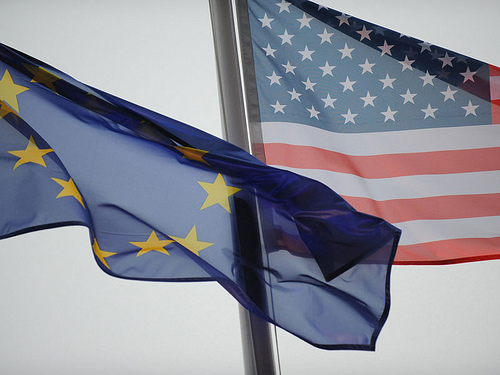
The German economy has "eclipsed" pre-crisis levels, Der Spiegel boldly proclaims, a fair enough statement the Economist retorts – however, where is the matching foreign policy? Comparing Nicolas Sarkozy’s hawkish rooster, to Germany’s "unadventurous eagle," has not necessarily helped the President in the polls. At least the Arctic Council and Catherine Ashton are on the rise, with the Council entering a new era of decision making and the EU foreign policy chief agreeing to hold negotiations in Bosnia and Herzegovina.
Headlines:
Every which way but solved (The Economist)
A bail-out strategy as bankrupt as Greece should be ditched. It probably won’t be. If April is the cruellest month for poets, May is the harshest one for European leaders. A year ago they tore up the rule book to bail out Greece and to ward off market attacks on other fiscal reprobates in the euro area. The first anniversary of the rescue mission has been nothing to celebrate. Despite a year of grinding hardship Greece looks ever more likely to have to restructure its debts. The official rescue funds hastily mustered in May 2010 have had to be deployed twice more since then, first to support Ireland late last year, and now to keep Portugal afloat.
German Economy Eclipses Pre-Crisis Levels (Spiegel)
The German economy grew by a surprising 1.5 percent in the first quarter of 2011 and recorded its largest year-on-year growth since reunification. But the biggest European surprise was further south — even the Greek economy is growing.
The unadventurous eagle (The Economist)
Europe’s biggest economic power seems reluctant to have a foreign policy to match.When Guido Westerwelle, Germany’s foreign minister, tires of sneers at home he escapes to the Middle East. In February he celebrated the Arab spring in Cairo’s Tahrir Square, drawing rare praise from the German media. In April he was back in the region. These getaways were designed to persuade voters that he is up to the job and the world that Germany is a useful and imaginative member of the western alliance.
Sarkozy’s Wars (The Economist)
The voters’ backing for foreign military adventures does not help the president.As part of a carefully laid plot to win re-election as president next year, Nicolas Sarkozy wanted to make 2011 the year he turned success abroad into renewed popularity at home. He had in mind the platform of France’s presidency of the G8, which has its summit in Deauville later this month, and the G20, which meets in Cannes in early November. Instead, the foreign adventures he has embarked on have been wars, in the name of liberty (Libya) and democracy (Côte d’Ivoire and Afghanistan). Will his new image as war leader win round the voters?
Clinton: Arctic Council enters new era of ‘decision-making’ (EUobserver)
The Arctic Council – a forum of eight countries with territory in the polar region – has agreed its first legally-binding agreement, marking it out as a burgeoning decision-making arena at a time when global interest in the region is spiraling.
Ministers agree on need for new EU border rules (Euractiv)
Interior ministers from the 27-country bloc have agreed to change the rules of the Schengen passport-free area, seeking to clarify conditions under which national governments can reinstate border controls following a high-level spat between France and Italy.
China accuses EU of political games on trade (EUobserver)
A senior Chinese official has accused her EU counterpart of being disingenuous about trade protectionism. Speaking at a press conference in Budapest on Thursday (12 May), Chinese deputy foreign miniser Fu Ying said the EU is refusing to grant China ‘market economy status’ for political reasons.
Russia may take action over U.S. missile shield (RIA Novosti)
Russia’s deputy defense minister has said action could be taken if the United States deploys its new missile defense system near Russia’s borders. In a news conference on Friday, deputy defense minister Anatoly Antonov said the Russian military was looking at ways to "protect our nation if Russia is not consulted in talks with NATO."
Ashton agrees to negotiations with Dodik (European Voice)
"Bosnian Serbs drop threat of referendum in exchange for talks on judiciary. Catherine Ashton, the European Union’s foreign policy chief, has agreed to hold negotiations with the Bosnian Serbs on the future of judicial institutions in Bosnia and Herzegovina.
EDITORIALS AND COLUMNS:
‘Dividing Forces are Mounting in Europe’ (Spiegel)
European Union officials are outraged about Denmark’s decision to restore border controls in violation of EU treaties. But a trend is emerging. German commentators worry that right-wing populism threatens to tear the EU apart.
Decision time (The Economist)
Germany continues to dither over how best to rescue the euro. Working in the bombastic Nazi-era edifice in Berlin that once housed Hermann Göring’s air ministry, then the headquarters of the Red Army and later much of East Germany’s communist government, Wolfgang Schäuble knows more than most how Germany’s democratic resurrection and reunification are bound up with European integration. But as the German finance minister wheels himself in to talk to the foreign media (he has been paralysed from the waist down since an assassination attempt in 1990), he cuts a lonely figure. A veteran of German unification, he is the leading pro-European in the cabinet. His instinctive response to the euro-zone crisis is more European integration. Germany is, after all, the euro’s principal beneficiary. But his country is ever more sceptical of the European Union and the single currency. German Europhiles feel beleaguered.
Image: transatlantic.jpg
